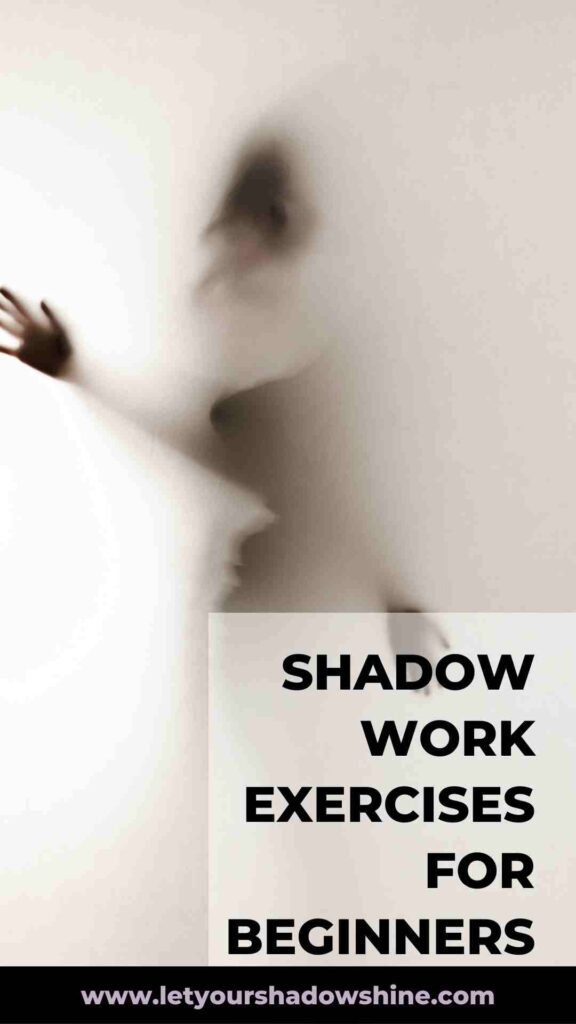3 Transformative Shadow Work Exercises For Deep Healing And Inner Peace
Discover the depths of your being with these powerful shadow work exercises, crafted to reveal your hidden truths and empower you to step confidently into your true self, take charge of your life, and cultivate a profound sense of purpose and fulfilment.
Table of Contents
Key takeouts
- The ‘shadow self’ refers to those parts of yourself that are often suppressed, denied, or hidden such as your fears, desires, and behaviour traits that are seen as unacceptable by society.
- Shadow work exercises reveal hidden aspects of yourself, giving you the power to integrate these shadows rather than letting them unconsciously shape your life. This journey transforms inner darkness into a source of strength and self-mastery, paving the way for authentic, empowered living.
- In this blog post, we will explore three life-changing shadow work exercises for beginners designed to help you deepen your connection with yourself and spark valuable insights along your journey of self-discovery, guiding you toward greater happiness and a deeper sense of purpose.
One does not become enlightened by imagining figures of light, but by making the darkness conscious.
Carl Jung
Welcome back, my friends. Today we are discussing a topic that is very close to my heart and inspired the name of my blog letyourshadowshine.com – shadow work.
Get ready to embrace your dark side as we discover the depths of your being and slowly unveil your truth with three transformative shadow work exercises for beginners.
Shadow work is a powerful journey of self-discovery. By embracing your shadow you will gain a more profound sense of self-acceptance, emotional resilience as well as inner harmony and balance.
In this blog post, I will walk you through three transformative shadow work exercises, share essential tips on how to start shadow work and how to approach shadow work safely and as always I will weave in my personal experiences as we go along.
Before we start, be mindful that shadow work can bring up some uncomfortable emotions. Should you ever feel like you need to talk to a therapist about some things that come up, I recommend seeking help and support from a professional.

What is shadow work?
How can I be substantial if I do not cast a shadow? I must have a dark side if I am to be whole.
Carl Jung
Shadow work is the journey of uncovering the hidden parts of ourselves, also called our ‘shadow’.
This shadow represents the sides of us that we tend to ignore or push aside, like our fears, insecurities, and unresolved emotions.
By exposing these aspects of ourselves to light, we can understand and accept them rather than letting them unconsciously control our behaviour.
Doing shadow work is a process of self-exploration, self-reflection, forgiveness, and self-acceptance.

Benefits of shadow work
Shadow work is also a spiritual practice and there are many mental health benefits resulting from shadow work such as:
- Cultivate self-awareness – shadow work encourages self-reflection, leading you to more self-awareness. Self-awareness is key for personal growth.
- Deep emotional healing – by engaging with your shadow, you have the opportunity to heal deep emotional wounds. Healing these deep emotional wounds can improve your overall mental well-being as you get a chance to free yourself from emotional baggage.
- Personal growth and transformation – by engaging with your shadow you have the opportunity to release limiting beliefs and behaviour patterns; allowing you to unlock your full potential and step into a greater version of yourself.
- Reach a sense of wholeness – by getting to know and accepting yourself fully you can achieve a greater sense of wholeness. This greater sense of wholeness can bring more self-acceptance and self-love, enabling you to live a more balanced and happier life overall.
Discovering your shadow self
The idea of the ‘shadow self’ goes back to Carl Jung, a Swiss psychiatrist.
What is the ‘shadow self’?
Do you have people in your life who seem to get everything they want ALL the time? The promotion, the happy family, the new shiny sports car, luxury weekend trips, a big social circle, you name it…They have it all and don’t even have to work for it.
Well, some people are just lucky and have it all, right?
But deep down it still bugs you that they get all these things so easily whereas you have to work so hard for them and still don’t have what they have.
Welcome to your shadow self – jealousy.
Your shadow self refers to those parts of yourself that are often suppressed, denied, or hidden. It also refers to unresolved emotions, such as fears, desires, and behaviour traits that are seen as unacceptable by society and the people around you.
How the shadow self forms
One of the first things we learn when we enter this world is the importance of fitting in. If you want to survive, you need to find your place in society.
Society teaches us what is socially acceptable and what isn’t. Behaviours such as sadness, anger, shame, guilt, fear, sexual desires, etc. count as unacceptable in our society. To fit in, you learn that it’s best to hide these parts of yourself that are not accepted by society.
But it’s not just society that forms the shadow self.
The shadow self is highly complex and we also have to keep in mind our upbringing, cultural influences, as well as any trauma or grief that we might have experienced throughout life.
3 Life-changing shadow work exercises for beginners
There are different shadow work activities to help heal one’s shadow. Below are three shadow work exercises for beginners I have been working with (and am still working with) along my journey.
To get the most out of these shadow work exercises, consider the following:
- keep in mind that shadow work can bring up some uncomfortable emotions
- be patient with yourself
- if you need a break, take a break
- allow yourself to be honest with yourself
- have compassion for yourself
Shadow work is a process of cultivating self-love from within. Be mindful of your needs during the process. Have compassion and understanding for yourself and don’t be afraid to ask for help.
1. Emotional inquiry through awareness
Everything that irritates us about others can lead us to an understanding of ourselves.
Carl Jung
Emotional inquiry is a shadow work exercise that you can do pretty much every day by simply bringing more awareness into your daily life.
Whenever you come into a situation where another person annoys you or puts you off, don’t get caught up in being annoyed. Instead, be aware of your reaction and the emotions that come up.
Take a step back and ask yourself:
- What is it that you find so annoying about this person/situation right now?
- What emotions came up for you?
- How can you use these emotions to get a better understanding of yourself?
- Did you feel any physical tension in your body?
- What does this experience tell you about yourself?
- Do you secretly wish you could be like this person?
- Do you maybe have similar behavior traits within you but you have been denying these?
- …
Be curious about yourself. Question yourself, start digging, self-reflect, and allow everything that comes up for you to come up.
Look at everything that comes up and treat everything as a possible insight about yourself.
Whatever bothers you in other people or certain situations, is likely to be a disowned part of yourself.
Once you are aware of this disowned part of yourself, you can start to integrate it and the less it will bother you in other people or situations moving forward.

2. Shadow work journal prompts
Shadow work journal prompts offer a gentle yet powerful gateway into shadow work, making them ideal for beginners.
Shadow work prompts allow you to explore hidden feelings and unconscious behaviour patterns in a structured and non-judgemental way, guiding you to reflect deeply without feeling too overwhelmed.
Journaling prompts also keep the process focused and manageable, helping you peel back layers gradually.
Set the scene for your shadow work journaling exercise:
- Make yourself comfortable – find a quiet corner in your home and eliminate any distractions
- Ground yourself – take a few deep inhales and exhales through your nose to help ground yourself
- Acceptance – allow yourself to write down whatever comes up for you
Next, have a look at the shadow work journal prompts below. Pick 1 or 2 journal prompts you feel drawn to and start journaling.
Shadow work journal prompts examples:
- Is it easy for you to ask for help? If not, why not? What holds you back?
- What quality do you most dislike in yourself and why?
- What behaviours in other people upset you most and why?
- What makes you feel appreciated and valued?
- Do you self-sabotage? When/what/why do you self-sabotage?
- How do you define success/failure? What does that tell you about yourself?
- What are your core values? Do you live in alignment with your core values?
- What events/people in your life hurt you the most and why did it/they hurt you?
- How do you tell your story to people around you? Are there any parts that you are leaving out? Why are you leaving them out? What are you afraid of?
- When was the last time you felt truly happy? What do you need to feel happy?
- What personality trait in others do you wish you had?
- Which emotions do you avoid and why?
- When was the last time you opened up to someone and got rejected? How did that make you feel?
Once you finished your journaling exercise, have a look at your notes.
Look for recurring patterns, triggers, or emotions that came up. These are often areas calling for attention.
Reflect on specific fears, limiting beliefs, or unresolved emotions that surfaced, and consider setting small goals to address them.
For example, if you notice self-doubt is a theme, your next step might be to seek supportive personal growth activities that help boost your confidence.
Commit to regular check-ins to track your personal growth, making adjustments as you uncover more about yourself through ongoing shadow work exercises.
For more shadow work journal prompts, check out my blog post 77 Shadow Work Journal Prompts – Awakening Your Inner Light.

3. Shadow work meditation
If you are into meditation or have an established meditation practice, shadow work meditation might be worth exploring.
Shadow work meditation involves sitting quietly and bringing your awareness to difficult emotions, past experiences or recurring negative thoughts you are aware of.
As these shadow aspects arise, you observe them with compassion, avoiding judgment or suppression.
By mindfully acknowledging and accepting these parts of yourself, shadow work meditation allows you to process and release deeply held emotions, fostering self-acceptance and a profound sense of inner peace.
Be aware that emotions might not be resolved within one meditation session. Shadow work takes time and you might have to revisit certain emotions several times before they begin to integrate.
Below is an outline of how I usually set myself up for shadow work meditation. Feel free to use this outline as inspiration. Adapt what feels in alignment with you and skip or replace what doesn’t.
Shadow work meditation – outline:
- Make yourself comfortable – find a quiet corner in your home and eliminate any distractions
- Ground yourself – sit comfortably, on a chair or an easy crossed-leged position; take a few deep inhales and exhales through your nose to help ground yourself and become present for your shadow work meditation
- Acceptance – allow yourself to be honest with yourself
- Observe – shift your awareness inward and
- imagine a shadow trait that you know about yourself and would like to explore or
- visualize a past event you would like to get more clarity about your shadow self
- Meet your shadow – allow your shadow to engage with you, feel into it and listen to what your shadow has to tell you
- Practice gratitude – express gratitude towards this emotion and appreciate its being and what you learned from it
- Integration – accept this emotion as a part of yourself
Allow yourself some time after your shadow work meditation to slowly ease back into your daily life.

Shadow work for beginners FAQ
What happens when your shadow is ignored
Ignoring the shadow self can lead to a range of psychological and emotional issues. Some of the key consequences can be:
- Projection – unacknowledged aspects of our shadow often get projected onto others. We might criticize or judge traits in others that we refuse to see in ourselves. This can lead to strained relationships and a lack of understanding and empathy.
- Internal conflict – denying parts of ourselves creates an internal conflict that can manifest in anxiety, depression or a general sense of unease.
- Missed opportunity for personal growth – by ignoring your shadow you miss out on the opportunity to learn more about yourself.
- Self-sabotage – if not acknowledged, the shadow can express itself in destructive ways like for example self-sabotage where we unconsciously engage in behaviours that hinder our success, happiness and well-being.
The shadow self is part of who we are and holds the keys to deeper self-understanding resulting in our personal growth and development.
By embracing your shadow you step into the most authentic version of yourself helping you to create long-term happiness and a more balanced and fulfilled life overall.
Is shadow work right for you?
Shadow work is a truly transformative practice that offers profound insights and healing. However, it’s not for everyone.
Below are some considerations to help you decide whether shadow work is right for you:
- Desire for self-improvement – if you are committed to your personal growth, and have a deep desire to connect with your truth, shadow work activities can be a powerful tool for transformation
- Feeling stuck – if you feel stuck in your life and are unsure of how to move forward, shadow work exercises might reveal hidden obstacles or suppressed desires that can guide you along your path
- Openness to change – if you are open to change, shadow work can bring you a range of new perspectives and lead to significant changes in how you view yourself and your life
Personally I would say that the desire for self-improvement and openness to change are key. If you are curious and approach shadow work with an open mind, you will get the most out of this experience.
Is shadow work dangerous?
Shadow work is not dangerous, but it can bring up some deep emotions and memories that can feel intense and overwhelming.
Shadow work might create discomfort, but discomfort is not always negative, I would say that discomfort is a big component of healing.
How do you start shadow work safely? Below are a few tips to help you take off the edge.
- Start gradually – start small and focus on manageable exercises such as for example journaling about a recent frustration; avoid diving into your most traumatic memories right away
- Practice self-compassion – be patient and kind with yourself; treat yourself as you would treat a friend who is in your shoes
- Seek support – if things get overwhelming, consider talking to a professional or joining a supportive community
Listen to yourself, practice self-love, respect your emotional limits and take this journey step by step.
How long does shadow work take?
Each shadow work journey is different and the timeline varies from person to person.
Some people might start noticing shifts right away, whereas others might have to invest more time until the first benefits show.
Shadow work and shadow integration are not quick fixes. They are a gradual journey of uncovering hidden aspects of ourselves and integrating what we learn along the way. This process takes time.
I have been doing shadow work for years and I am still unravelling things about myself and there are certain shadow aspects that I keep revisiting.
Honestly, I don’t think there is a timeline for shadow work. Take it step by step and embrace the journey as an ongoing practice of self-acceptance and personal growth.
Shadow work and meeting your inner shadow can be challenging, but in a way, everything related to your personal growth can feel challenging at times as you are being pushed outside of your comfort zone.
But as I mentioned earlier, discomfort is not always bad as it holds a lot of potential for growth if you are open to it.
Getting to know my shadow self gave me so many insights about myself, why I am the way I am, why I sometimes can’t help myself even though I know better on paper, why I feel strongly about certain values, why I have certain relationships patterns and why they are difficult for me to overcome, etc.
Your shadow holds so many interesting aspects of yourself, do yourself a favour and explore. It has been a pretty cool journey for me. And if you find out that shadow work is not for you, you can always stop along the way.
One thing that was a HUGE help along my self-discovery and healing journey was having a regular yoga practice. Yoga is a powerful way to help you work through emotions.
Yoga encourages a deep body, mind and soul connection and opens us up to our inner world allowing us to become more aware of our bodies’ sensations and internal emotions. This mind-body connection helps to build resilience and cultivate self-acceptance, supporting a more balanced and emotionally healthy life overall.
I am a certified yoga teacher and if you are interested in starting a regular yoga practice, check out my weekly class schedule and free online offerings. For a personalized plan to help you start your yoga practice, email me today. I look forward to seeing you on the mat.
Enjoy getting to know your dark side my friends and see you next week 🖤.
Stay wild,
Nicolle
Featured image: Photo by Volkan Olmez on Unsplash
Hi, I’m Nicolle, a certified Personal Trainer, Yoga Teacher, and Blogger. I’m the founder of Let Your Shadow Shine and the voice behind this blog — your space for fitness, well-being, and self-discovery. On this blog, you will find empowering movement practices, holistic well-being tips and personal growth inspiration, all helping you to live with intention and create a life aligned with your inner truth.






A really great article. I’m looking forward to reading more on your site.
Thanks so much, Shannon! Happy to hear that you liked the post and would be nice to welcome you back to the blog!!
I absolutely loved this post! It’s a great introduction to shadow work. I really like the journal prompts you included as well. Thank you!
Thanks so much, Megan! Always good to see your name on here 😉
Happy to hear that you like the journal prompts!!
Thank you for this, I have heard about shadow work but didn’t know much about it. I will definitely give it a try because I think it will be very helpful. I am really glad I found your blog because you seem to have some awesome content! I will definitely be reading more!!
Awww, thanks so much Hannah, so happy to hear that you are enjoying my blog 😉
Thank you for this post. I keep coming across the term shadow work, but no one has said what exactly that is or how to start. So this was a great find, now that I know what to do I can get started.
Thanks so much for stopping by Josie, happy to hear that this helped.
I love this, very well written and explained, it’s never too late to learn and your article thought me a lot !! Now on to practicing… number 1 is the one I am willing to start with
Thank you so so much for all the preciousness of your blog, love it !!! 🤍🖤
So super happy to hear this, thank you so much for your kind words!!
Hope to see you back on my blog very soon 🖤